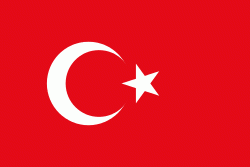Lice (Lice)
Lice (pronounced ), (Licê, ليجه, ) is a Kurdish-populated town in Diyarbakır Province in Turkey. The population was 9,644 in 2010. It is located 90 km from the capital, Diyarbakır. In the local elections in March 2019 Tarık Mercan from the Peoples' Democratic Party (HDP) was elected mayor. As the current District Governor was appointed Cevdet Bakkal.
Lice was the headquarters of the 5th Army Corps of the Turkish army during the Sheikh Said rebellion in 1925 and it was a focal point at the beginning of the rebellion. The town was captured on the 20 February by the troops loyal to Sheikh Said. The Kurdish Zirki tribe in the Lice district also supported the Sheik Said rebellion and as a reprisal, the tribes villages Çaylarbaşı, Kurlu, Alataş, Mat-bur and Çağlayan have been demolished and the residing population was killed by troops of the Turkish army. It was reported that the troops of the Turkish Major Ali Haydar have wiped out the majority of the Sheikhs.
On 6 September 1975, Lice was struck by an earthquake with a magnitude of 6.7. Around 1.500 people were killed in Lice according to the mayor.
The Kurdistan Workers' Party or PKK, was founded in the village of Fis, in Lice district on November 27, 1978.
The Lice massacre, during which the Turkish army demolished large parts of the town in reprisal of the death of an Jandarma officer, took place from October 20–23, 1993.
Between 2018 and 2019 localities in the Lice district have often been targeted with curfews declared by the Turkish authorities, which wanted to execute security operations in the district.
The Kurdish castle of Ataq used to exist near the modern Lice.
Lice was the headquarters of the 5th Army Corps of the Turkish army during the Sheikh Said rebellion in 1925 and it was a focal point at the beginning of the rebellion. The town was captured on the 20 February by the troops loyal to Sheikh Said. The Kurdish Zirki tribe in the Lice district also supported the Sheik Said rebellion and as a reprisal, the tribes villages Çaylarbaşı, Kurlu, Alataş, Mat-bur and Çağlayan have been demolished and the residing population was killed by troops of the Turkish army. It was reported that the troops of the Turkish Major Ali Haydar have wiped out the majority of the Sheikhs.
On 6 September 1975, Lice was struck by an earthquake with a magnitude of 6.7. Around 1.500 people were killed in Lice according to the mayor.
The Kurdistan Workers' Party or PKK, was founded in the village of Fis, in Lice district on November 27, 1978.
The Lice massacre, during which the Turkish army demolished large parts of the town in reprisal of the death of an Jandarma officer, took place from October 20–23, 1993.
Between 2018 and 2019 localities in the Lice district have often been targeted with curfews declared by the Turkish authorities, which wanted to execute security operations in the district.
The Kurdish castle of Ataq used to exist near the modern Lice.
Map - Lice (Lice)
Map
Country - Turkey
 |
|
| Flag of Turkey | |
One of the world's earliest permanently settled regions, present-day Turkey was home to important Neolithic sites like Göbekli Tepe, and was inhabited by ancient civilisations including the Hattians, Hittites, Anatolian peoples, Mycenaean Greeks, Persians and others. Following the conquests of Alexander the Great which started the Hellenistic period, most of the ancient regions in modern Turkey were culturally Hellenised, which continued during the Byzantine era. The Seljuk Turks began migrating in the 11th century, and the Sultanate of Rum ruled Anatolia until the Mongol invasion in 1243, when it disintegrated into small Turkish principalities. Beginning in the late 13th century, the Ottomans united the principalities and conquered the Balkans, and the Turkification of Anatolia increased during the Ottoman period. After Mehmed II conquered Constantinople (Istanbul) in 1453, Ottoman expansion continued under Selim I. During the reign of Suleiman the Magnificent, the Ottoman Empire became a global power. From the late 18th century onwards, the empire's power declined with a gradual loss of territories. Mahmud II started a period of modernisation in the early 19th century. The Young Turk Revolution of 1908 restricted the authority of the Sultan and restored the Ottoman Parliament after a 30-year suspension, ushering the empire into a multi-party period. The 1913 coup d'état put the country under the control of the Three Pashas, who facilitated the Empire's entry into World War I as part of the Central Powers in 1914. During the war, the Ottoman government committed genocides against its Armenian, Greek and Assyrian subjects. After its defeat in the war, the Ottoman Empire was partitioned.
Currency / Language
| ISO | Currency | Symbol | Significant figures |
|---|---|---|---|
| TRY | Turkish lira | ₺ | 2 |
| ISO | Language |
|---|---|
| AV | Avar language |
| AZ | Azerbaijani language |
| KU | Kurdish language |
| TR | Turkish language |















